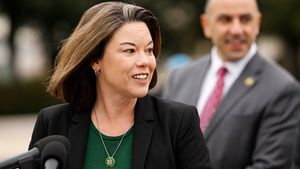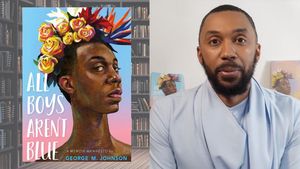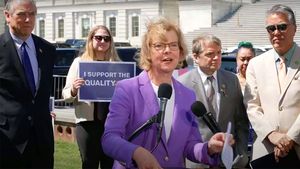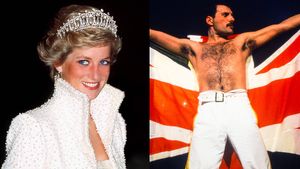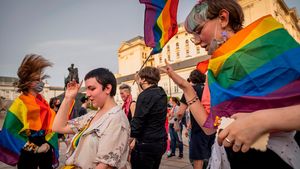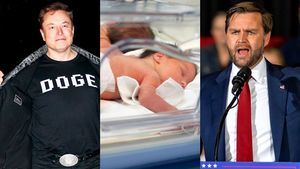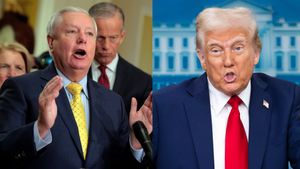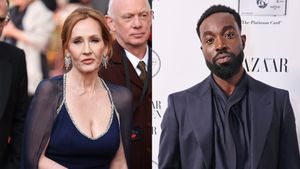CONTACTAbout UsCAREER OPPORTUNITIESADVERTISE WITH USPRIVACY POLICYPRIVACY PREFERENCESTERMS OF USELEGAL NOTICE
© 2025 Pride Publishing Inc.
All Rights reserved
All Rights reserved
By continuing to use our site, you agree to our Private Policy and Terms of Use.
There's a buzz in the air all over West Hollywood. Banners are heralding the dates. Circulars are in all the stores. Overheard in Starbucks on Santa Monica: 'What are you seeing on Saturday night? I can't decide.' 'I know, it's like Sophie's Choice.' It's typical. It happens every year around this time as L.A. gets ready for Outfest, 11 days of GLBT films which play this year July 8-18, and are accompanied by roughly 4000 parties, industry panels, a huge gala, and some of the best mingling of the year.
In anticipation of this, the 28th annual Outfest, Out hosted a small gathering at the French Market, a West Hollywood mainstay. There, with Judy Garland belting in the background, we talked to a quintet of unconscionably beautiful men whose work will be featured in the festival: David Burtka, actor in the short GaySharkTank.com; Guy Shalem, writer/director/producer of GaySharkTank.com; Nicholas Downs, actor in the romantic comedy Is It Just Me?; Heath Daniels, writer and star of the short Go Go Reject; and J.B. Ghuman, writer/director of the closing night film, Spork.
Out: The common denominator between the five of you is that you all have films in Outfest. With gay films so much more available then they were 28 years ago, and gay characters more present in mainstream movies, do we still need Outfest and if so, why?
David Burtka: I think Outfest is such a great vessel for people to put out their films and for people to see gay films. Mainstream movies are not the same as gay films. Having a gay vehicle for people to be able to see into our world is really important.
Guy Shalem: I think that there are so many gay films out there that don't get to be seen except at these kinds of festivals. It's important to have an outlet to showcase them. What's great about Outfest particularly is that it attracts so much publicity. You can't find a platform like that on the Internet or by showing your film on YouTube.
Nicholas Downs: I think we're in a situation where, if a lot of our films were submitted to mainstream film festivals, we wouldn't get in. I think Outfest is very important and until mainstream film festivals start to show more gay films, we are not going to get there. People want to take affirmative action away but I don't think that as a country we are ready to take affirmative action away. I think it's kind of the same thing. It's crossing over. But I do think that more films are coming out about people who just happen to be gay, and less are about coming out or about people dying of an illness.
J.B. Ghuman: I just got back from the Tribeca Film Festival and I am excited to be in a gay film festival. I do think it's important for gay media and gay stories to be meshed into the mainstream but it's also good to have a good sense of self and individuality. No matter how mainstream anything gets, I still think it's important. I don't know if I would call Spork a gay or lesbian film. My main character is intersex and I am excited to share it on this platform. I am a gay filmmaker and I want my stories and the things that I make to always be part of my community. So Outfest should always be necessary no matter what happens in the mainstream. We should always have a strong sense of who we are and what we're part of.
Shalem: A lot of times there are certain movies that cater to the gay fantasy, which is good and it's fun but it's very Hollywood. It's important for us to make legitimate statements about the gay community that are not as prevalent in the straight community, like talking about drug abuse and loneliness and how youth obsessed and judgmental we are. I tried to put as many of these statements as I could in GaySharkTank. I wanted to be honest and go for what we are really about. At the end of the day, a lot of us are sitting at home alone. A lot of us have a lot to offer but we feel like we don't have what it takes. I think that is what GaySharkTank is about.
Heath Daniels: In my film, the fact that I'm gay is never even addressed. The word gay isn't mentioned. The guy had enough going against him, why deal with the fact that he was gay? I didn't want my character to have issues with being gay, it just was. If we can stop having issues with ourselves, maybe other people won't.
Downs: What everybody is saying is affirmation that Outfest is important.
J.B., your film, Spork, is especially out of the box in terms of sexuality issues. It's inclusion in the festival reflects the ways Outfest has evolved. As Nicholas said, we are now beyond coming-out stories and AIDS stories.
Ghuman: Obviously the message is universal. My message isn't embedded in a gay character but it's all the same: loving yourself and nurturing your substance over your superficial. My film is about being as wacky and as crazy as you are. For Spork, the lead character -- not a spoon, not a fork -- that whole duality is how we all kind of feel. We all feel alone and so different. And so crazy. And we are, in beautiful ways. But if we all feel that way then we're all the same. Outfest has given me such a platform. To allow me to share the film on this kind of level, it's rad! It just shows that you can tell a story without getting caught up in, 'Is it a gay film?' It's about the message and about the filmmaker and where they came from. At the end of the day, it's not about whether a character makes you go 'That's me to a T,' but whether the character is relatable.
I wonder if short films like yours, Heath, would even get produced if film makers didn't know that they had festivals like Outfest where they could be shown.
Daniels: I made my film because of Outfest. It was first on the list [of festivals] I wanted to take the film to. I was at Outfest a couple of years ago and I was like, "I want to play here someday." With Outfest, I can be in Los Angeles, with my people, and have my movie on the screen. That's what I want. The whole time I was making it I was like, "It has to get into Outfest!"
Shalem: With shorts, you know you're putting your own money in. You don't really see any money. We shot the movie in two and a half hours. I actually made it as a gift to Jane Lynch, who is getting the Outfest Lifetime Achievement Award. My other objective was to sleep with David, but he's attached.
[To David] That's not how you got your role?
Shalem: Actually he got his role because he was our caterer.
Burtka: I am a caterer as well as an actor and they asked me to cater the shoot. I was chef-ing the whole day and then, in the last 20 minutes, Guy was like 'Come on.' So I shot the last 20 minutes and ended up in the film.
Shalem: He just jumped in, no preparation. And he was so good!
Three of you are gay actors and in 2010 I think it remains an interesting question whether or not actors should come out. There was that infamous Newsweek article about how gay actors can't play straight and while I am sure we all disagree with the article's point of view, how is it for you, as gay actors, seeing that a piece like that even gets printed?
Shalem: Sean Hayes went back in the closet, by the way.
Burtka: I know a lot of actors who are still in the closet who think it's going to help them. It's not going to help them mentally or in their personal world and aren't they sort of linked? If you are not comfortable in your skin, how can you be comfortable in an audition room? Or acting in a play? I have no issue with it. I played straight on Broadway but I have never had that discrimination. When I moved to L.A., I had one casting director call me "light"'
Downs: I've been called "light" before.
Is that a problem? Is it like, 'Oooh! I'm busted!'?
Daniels: No one is mistaking me for Russell Crowe. I don't think it's ever been a question, really. I don't think I would ever get cast as a romantic, straight lead and I am not pursuing that. I am fine with that.
Burtka: The great thing is that there are so many great, rich gay characters. The spectrum is huge and we are seeing more gay people in movies. So if I play a gay guy the rest of my life, that's fine. As long as I am acting.
Downs: When I was a little younger, I had it in the back of my head, Do I say something? Do I not? This film has been really pivotal for me. People have reacted really well, knowing that I am gay and playing gay. I was recently asked if I was out and I said, 'I was never really in.' I don't have a monkey on my shoulder.
Even though there was no coming out for you, this movie gave you the opportunity to say 'By the way, I am.' That's a big deal.
Downs: It's perfectly placed in terms of career and time. For a long time I had wanted to play a gay character, but maybe if it happened five years earlier I wouldn't have handled it the same. The right part came along at the right time. It happened in an interview with a Detroit paper. I started talking and it came out and it was like, "That was easy, that was fine. I didn't implode or explode." Ever since then, it's been easier just to be open and honest.
What about the festival are you most looking forward to?
Ghuman: My film is a dark comedy. I am interested to see how this community reacts to it.
Daniels: Seeing my movie at the DGA! It's acceptance in the fact that I made a good enough film that Outfest is honoring it with a screening. I live in Los Angeles, I made a film in Los Angeles, and its screening in Los Angeles on a massive screen with a really appreciative audience. I can't wait. I am really honored.
Downs: I remember coming to Outfest eight or nine years ago and thinking, I would love to have a film here. And now it's happening! Plus it's shot in West Hollywood, so to show it here is a total homecoming.
Check out = and Out.com over the next 10 days for reviews from Outfest 2010. To get more information and tickets to the festival, click here.







